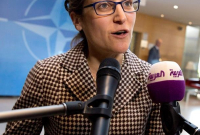Support strong Canadian climate journalism for 2025
Foreign Affairs Minister Chrystia Freeland says the world wants Canada to trumpet tolerance and diversity. That's her plan for what is being billed as a major foreign policy speech early next month.
International figures, such as former UN secretary general Kofi Annan, think that's a fine idea and about time too, in a world grappling with growing nativism, intolerance and anti-immigration sentiment — a phenomenon they lay at the feet of U.S. President Donald Trump.
But Freeland diverges with many in the world on whether that values speech needs to aim at Trump.
Annan, who was in Ottawa recently to help launch a new think-tank devoted to the study of pluralism, says the time has come for politicians to show courage and speak out in the face of disturbing new global trends.
Freeland is no less passionate about defending and advocating on behalf of what she has called the "open society."
But when it comes to how that might be accomplished, her approach might be described as: no shouting at Trump please, we're Canadian.
"I am a big believer in humility being a Canadian and national virtue," the minister told The Canadian Press in an interview last week. "We're all taught as kids that bragging is not polite.
"Having said that, I think that ambition is not the opposite of humility. And now is a great moment for Canada to be ambitious at home . . . and be ambitious about what our voice can accomplish in the world."
Freeland adds the "world is really listening for what Canada has to say."
In the past, an assertion like that could have been dismissed as self-serving bombast.
However, a group of prominent international observers — who will play a role in shaping the foreign policy discussion in Canada in coming years — are cajoling Prime Minister Justin Trudeau's Liberals to take to the rooftops and start shouting. They say it is a message that needs to be heard not only in the U.S., but in Europe, Latin America and the Middle East.
"Mainstream leaders have to have the courage to take on these issues and offer alternatives," said Annan, who is a board member of the Ottawa-based Global Centre for Pluralism, which has the backing of the federal government and the Aga Khan.
Annan said whenever he speaks in the United States, he tells Americans to look to their northern neighbour as an example of good behaviour.
"Three, four weeks before the election, nobody thought Trudeau would win. But he started speaking to the people, defending Canadian values — we will receive refugees, we will welcome them," Annan said.
"I think you're on the right track and I hope others will follow you. Not the other way around."
With Trudeau headed back to Europe this week for the NATO and G7 summits in Brussels and Sicily — the prime minister will be in lockstep with Trump's debut on the multilateral stage — Annan said that continent needs to learn a few things from Canada about opening borders to refugees.
"For a community of 500 million people in the European Union, to receive one million in one year was imminently doable if the will was there," he said.
"And here, because you're open and you understand pluralism, you don't have that problem."
Eduardo Stein, a former vice-president and foreign minister of Guatemala, said with more people looking inward, the Canadian government's message that diversity equals strength, not division, has never been as timely, given the populist tide that brought Trump to power.
"This Jacksonian populism, which is not new but has taken a formidable strength … is accompanied by what we find in Latin America as another very serious threat to political stability, which is a total disregard for expert knowledge," said Stein, a pluralism centre board member.
Marwan Muasher, a former Jordanian deputy prime minister and foreign minister, said the lack of respect for diversity is the root cause of Middle East instability, including the ongoing violence in Syria, Iraq, Yemen and Libya.
"When I visit Canada, I am uplifted by what I see. Pluralism actually works," said Muasher, another board member. "Compare it to my region, where a lack of pluralism has been a major cause of turmoil."
Muasher said the main conflict in the Middle East amounts "a battle for pluralism . . . and about preserving the right for each community to be different and respect that difference."
Freeland said her speech will reflect the fact that Canada is an outward-looking, generous country that wants to engage widely outside its borders.
"We're looking to advance our national interest and I think we're looking also to amplify our national voice in the world."
— with files from Alexander Panetta in Washington





Comments